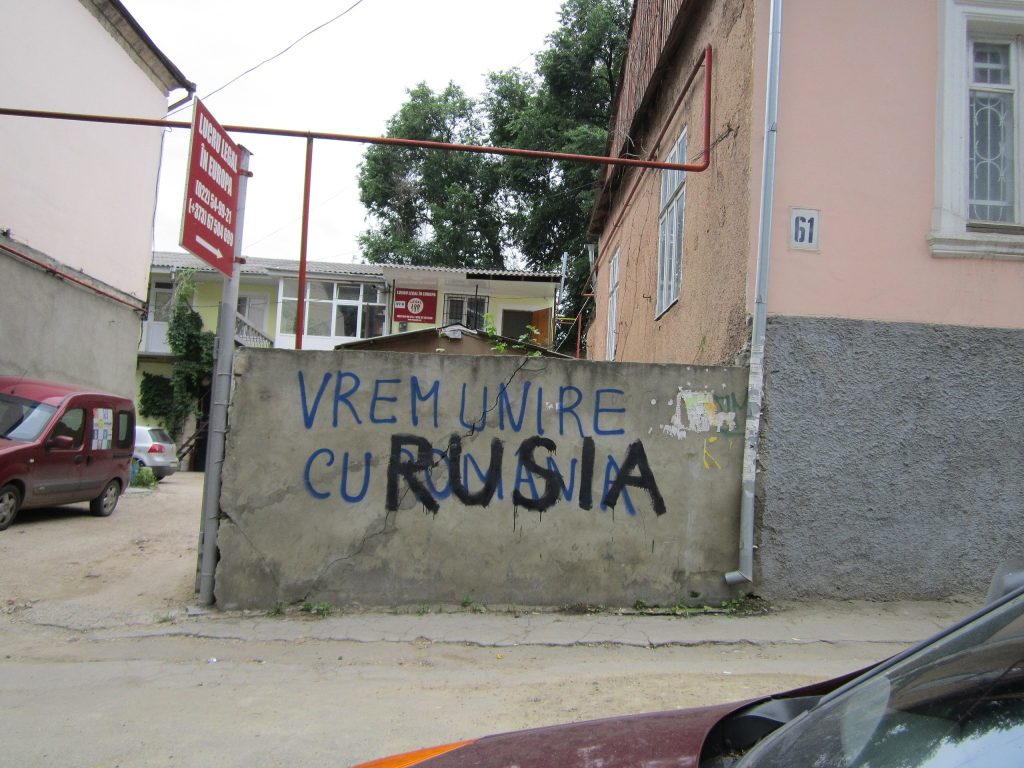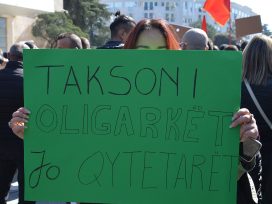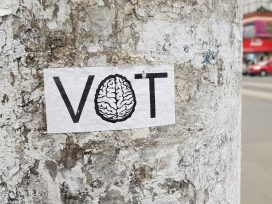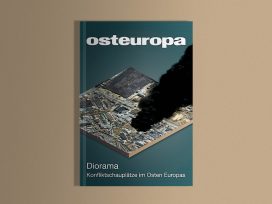Moldova: End of the experiment?
Maia Sandu came to power in Moldova by promising social unity. But as her popularity declines, she and her party may be reverting to divide and rule. Russian interests in destabilizing the country are real but of limited impact. The greater threats to democracy in Moldova are endogenous.
In 2020 and 2021 Moldova experienced an electoral revolution in two stages. First, in the presidential elections of November 2020, the leader of the Party of Action and Solidarity, Maia Sandu – a politician with a reputation for being principled and honest – inflicted a heavy defeat on Igor Dodon, the pro-Russian incumbent. Dodon had been head of state from 2016 to 2020 but was unable to offer anything to counter his challenger.
Sandu did something that was unconventional for a Moldovan politician: she avoided playing on the divisions between pro-western and pro-Russian camps. Although she spoke of the necessity of integrating the country into Europe, geopolitics was not the basis of her campaign. Instead, she emphasized her ability to deal with corruption and poverty, saying she would reform and strengthen state institutions and promising justice and prosperity for every citizen. Her slogan was, ‘It’s time for decent people!’ And she won.
In 2021, Sandu called early parliamentary elections. Sure enough, in July that year, her Party of Action and Solidarity (PAS) repeated her success at the ballot box. During the campaign, PAS followed the same recipe: keeping geopolitics to a minimum, promising to solve the real problems of the country and its inhabitants, and advocating reforms and the building of resilient state institutions.
Ever since gaining independence, Moldovan society has been split between those on the Right seeking stronger ties with the West and those on the Left who feel closer to Russia. Politicians have rarely attempted to win votes from both sides. Maia Sandu and her party achieved something that had never before been done by parties on the right: they moved seamlessly into the centre without losing their core voters. The PAS won a majority in parliament and formed a government on its own, headed by Natalia Gavrilița, a longstanding associate of Sandu.
For the first time in many years, power in Moldova was in the hands of a single team. With this power came responsibility for everything that was happening in the country. And this is where the problems began.

Graffiti in Chisinau 2013. Image: Simiprof. Source: Wikimedia Commons
Hope for change
Sandu came to power after a difficult period in Moldovan politics. She and her team supplanted the regime built up by the oligarch Vladimir Plahotniuc, who had largely been in control of the country from 2014 to 2019, without holding any official positions. What would later be called ‘the heist of the century’ occurred during this period: in 2014, $1 billion – a vast amount by local standards – was illegally syphoned out of three Moldovan banks.
Beyond that, Plahotniuc’s reign was characterized by persecution of the opposition and pressuring of the media: undesirable and inconvenient individuals were illegally bugged; criminal cases were fabricated. Because the entire justice system – from the prosecutor’s office down to the courts – was under the oligarch’s control, it was impossible to seek legal recourse. Plahotniuc’s hold over parliament was another story. He was chairman of the Democratic Party, which had a minority of seats in parliament, but by buying off deputies from other factions lured as many parliamentarians to its side as it needed to get laws passed.
Plahotniuc even went as far as to amend the constitution to serve his own interests: via the Constitutional Court, which was also under his control, he managed to achieve a situation in which the president was chosen not by parliament, but by national plebiscite. The basic law was changed not by a parliamentary majority or a referendum, but a ruling from the Constitutional Court itself, which does not have the right to change the constitution but only to interpret it.
The oligarch needed the amendment to split the opposition and thus preserve his influence over state institutions. And this is what happened: in 2016, with Plahotniuc’s support, Igor Dodon was elected president, triumphing over none other than Maia Sandu. During that period, Moldova was described as a ‘captured state’.
The oligarch’s omnipotence came to an end in June 2019 after intervention from Moldova’s foreign partners. It was a situation that is impossible to imagine today: Russia on one side and the US and EU on the other put aside their conflict over the Donbass and Crimea and joined forces to strip Plahotniuc of his powers. Following a conversation with Dereck Hogan, the US ambassador to Moldova, the oligarch fled the country and has not returned since. The parliament, which was full of PAS MPs, adopted a ‘Declaration on a Captured State’, promising to return the country to a constitutional path.
This promise was one of the reasons that Sandu and her team received unprecedented support. It was not only their pre-election tactics that worked in their favour, but also people’s hope and faith of that the situation in the Republic could still be changed for the better.
Harvesting crises
Sandu and her team came to power amid a crisis: the coronavirus pandemic. Soon it was supplemented by an energy crisis: the prices for the Russian gas on which the country depends began to rise in 2021, and in 2022 they simply skyrocketed. Gazprom signed a new gas contract with Moldova in 2021 based on a ‘mixed formula’ instead of fixed-rate tariff, as had previously been the case.1 The formula was the outcome of negotiations with Moscow, after Chisinau claimed that Russia was blackmailing Moldova by linking gas supply with the Transnistrian settlement. This formula was profitable as long as the price on the spot market remained steady. But at the beginning of 2022, following the Russian invasion of Ukraine, gas became vastly more expensive. The knock-on effect has been a rise in the price of literally everything.
Protests began in the country, with those politicians openly pro-Russia encouraging people to go out onto the streets. Participants berated the authorities in general, and Maia Sandu personally, for what they saw as Chisinau’s failure to reach an agreement with Russia on a more favourable price for gas. At the protests, demonstrators demanded that Sandu effectively fall at the feet of Russian president and beg for cheap gas.
In response, Moldova’s leadership accused Russia of waging a ‘hybrid war’ against the Republic and ‘weaponising’ gas to achieve its political goals – statements to be seen in the context of the unprecedented Russian cyber-attacks on the Moldovan government agencies and the increased activity of pro-Russian political forces. The government accused the organisers and participants of the protests of acting in Moscow’s interests: namely by attempting to overthrow a democratically elected government and destabilising the situation in the country, so as to force a change in Moldova’s foreign policy from a pro-European to a pro-Russian course.
Russia is indeed interested in a change of government in Moldova. Before Russia attacked Ukraine, Sandu and PAS had stated that Chisinau would like to develop a mutually beneficial and pragmatic relationship with Moscow. Since 24 February 2022, however, the Moldovan government has supported Ukraine and condemned the actions of the Russian leadership. Moldovan–Russian relations are now almost completely frozen, reduced exclusively to diplomatic presence in each other’s capitals. Chisinau has also suspended its cooperation with the Commonwealth of Independent States (CIS), created by the former republics of the USSR. Meanwhile, the Moldovan authorities have begun to make cautious statements to the effect that the country should abandon its neutral status in view of the threat from Russia.
Moscow has consistently tried to extend its influence over the Republic and to keep it within its own orbit, and discussions like this are definitely not to its liking. Since 2014, Moscow – and Vladimir Putin personally – have provided Igor Dodon and his Socialist Party with political, informational and financial support. Yet neither the Socialist Party nor Dodon himself ever obtained real power. Despite serving as president for four years, Dodon’s influence was severely limited for two reasons. The first is that in the Moldovan constitution the presidency is a more ceremonial post: historically, if the pro-presidential party controls the parliament, the head of state has more influence. The second reason is that the socialists were unable to gain a majority in parliament, which would have given Dodon a solid base and provided him with real power.
At present, Moscow’s options for intervention in the Moldovan political sphere are even more limited. First, because the Kremlin is occupied primarily with Ukraine, in a war in which it has failed to achieve success. Second, because Russia is no longer banking on Dodon, but on Ilan Shor – not the most advantageous choice.
Ilan Shor is a Moldovan businessman and leader of the Șor party, renamed thus after he took over in 2016. The Șor party is now represented in the Moldovan parliament by six deputies and is fairly popular: a recent opinion poll showed support at 10%. This is explained partly by the fact that its politicians are professional populists. They promise everyone wellbeing and prosperity, focusing primarily on the elderly. To show that these are not just words, the Șor party has opened a network of so-called ‘social shops’ in Moldova, in which foodstuffs, including staples such as bread, cost less than in other retail chains.
At the same time, Ilan Shor’s biography contains one important and proven fact: he is accused of complicity in the ‘heist of the century’. Banks controlled by Shor were an important link in the chain through which the money was extracted. The banks have since been liquidated, and Shor himself lives in Israel, from where he coordinates anti-government protests in Moldova. These protests have been going on since summer 2022 but are poorly attended and do not look like a serious threat to the government. Moldovan media have reported on a number of occasions that people are being bussed into Chisinau from the regions and being paid in cash for participating.
In mid-April 2023, Shor was sentenced in absentia by the Chisinau Court of Appeal Court of Appeal to fifteen years in prison. Despite this, he continues to try to influence the situation in Gagauzia – a southern region of Moldova with traditionally strong pro-Russian sentiments. Local elections will be held in the Gagauz autonomy on 30 April. Shor has endorsed a candidate named Evgenia Gutsul, who is also supported by Leonid Slutsky, the Chairman of the Committee on Foreign Affairs of the State Duma, and Russian singers Philipp Kirkorov and Nikolai Baskov. This again highlights Shor’s ties to Moscow. Currently lacking the ability to influence the Moldovan government as a whole, Russia is trying to strengthen its influence in individual regions of the Republic.
War and backlash
But a far bigger problem for Sandu’s team is that she and her party are losing popularity. If in parliamentary elections in 2021 the Party of Action and Solidarity received 52.8% of the vote, then a poll carried out at the end of 2022 by the International Republican Institute showed that the ruling party could now count only on 24%. The diminishing popularity of the government may well be the result of criticism from the pro-Russian opposition. But it also stems from the way it is running the country and communicating with society.
For example, even after oil and gas prices fell on global markets from mid-2022, the Republic’s population continued to pay a high price for fuel. Gas bills this winter came to hundreds of euros. From autumn 2022, householders in Moldova have been paying 29.27 Moldovan lei or €1.5 per cubic meter of gas. For a country where the average salary is €550, and pensions far lower, these are unaffordable prices. In January 2021, the cost of a cubic meter of gas was half as much. The Moldovan authorities attempted to alleviate the burden on the population by introducing a partial refund mechanism, however this scheme ceased as from April 2023.
When asked why prices were not falling, the government could not give a coherent answer. ‘Everyone has the same question here, but we have not yet received an answer to it from anybody’, says Chisinau economic expert Victor Ciobanu.2 Naturally, Moldovans are projecting their dissatisfaction with high fuel prices onto the authorities.
The outbreak of war in Ukraine placed Moldova under additional, extremely severe stress. Hundreds of thousands of Ukrainian refugees entered the country seeking shelter from the war. By various estimates, 80,000 to 100,000 remain. Moldova has had no prior experience of dealing with so many refugees. A platform (dopomoga.gov.md) where Ukrainian citizens could quickly receive all the information they needed and get the necessary assistance was swiftly set up. It is recognised as an example of a successful large-scale project involving various government agencies.
Refugees are not the only challenge. The war has severed the supply chains for exporting Moldovan agricultural produce to the Russian and Belarusian markets. Circumventing Ukraine caused transportation costs to go through the roof, forcing farmers to seek other means of selling or recycling their produce. The overall impact of these crises on the economy, which was hardly strong anyway, was a serious fall in GDP – by 5.9% in 2022.
But there was also a success: Moldova was granted the status of candidate for EU membership in June 2022. While the Moldovan authorities have claimed credit for this, the catalyst for the EU authorities was the Russia–Ukraine war. For Brussels, which granted candidate status to both Kyiv and Chisinau in record time, it was largely a gesture of support for Ukraine in its fight against the Russian attacker.
European integration is currently the main priority for the Moldovan government. Sandu has called on the population to take part in a rally for European integration on the central square of Chisinau on 21 May to demonstrate support for this process. On 1 June 2023, Moldova will host the second summit of the European Political Community, the club of nations founded after the Russian invasion of Ukraine in 2022. The fact that the meeting will be held in Moldova is a clear signal of political support in Europe for the Republic’s integration aspirations.
Unfulfilled promises
While external factors, above all Russian energy policy, have had had a major impact on the situation in the country, what the authorities are doing – or not doing – also need to be understood. Above all, the promise by Sandu and her party to return the country to a constitutional path remains unfulfilled. In 2016 the Constitutional Court did not simply exceed its powers but broke the law. There are therefore strong grounds for seeing all presidential elections held since then as having taken place outside the legal framework.
Yet there is little support for reversing the constitutional amendments. Neither the government nor the opposition raise the issue, the press has forgotten about it, and the public – preoccupied with daily survival – simply doesn’t care. As a result, the system continues to operate according to the electoral rules established by Plahotniuc.
Promises to prosecute those who were involved in the ‘capture of the state’ during the Plahotniuc era also remain unfulfilled. The oligarch himself is wanted by police, but remains out of the reach of Moldovan justice: some sources claim he is living in North Cyprus. Many of his inner circle – people who prepared and carried out decisions designed to subordinate state institutions, who fabricated criminal cases and organised surveillance and bugging – continue to live in Moldova and have not been brought to justice.
Sandu and her supporters have promised to ensure that the judiciary, which in Moldova is perennially prone to political interference, functions independently. Sandu has said that the system must be rid of compromised and corrupt judges and prosecutors. However, the government’s reforms have raised more and more questions.
In 2021 the Prosecutor General, Alexandr Stoianoglo, was successfully removed and a criminal case opened against him. Stoianoglo had been appointed in 2019, soon after the fall of the Plahotniuc regime and the dismissal of his predecessor, who was controlled by the oligarch. At Stoianoglo’s direction, proof was gathered of Plahotniuc’s involvement in the theft of $1 billion from Moldovan banks. However, a conflict broke out between Stoianoglo and Sandu, leading to his dismissal and a criminal investigation against him on charges of passive corruption and abuse of power.
These charges are now being heard in court. Stoianoglo himself is awaiting a decision from the European Court of Human Rights on the legality of his dismissal and subsequent arrest. The outcome is not yet clear, but the episode appeared to have a political aspect. This impression was confirmed by the amendments to the law that would allow the president to initiate the dismissal of the prosecutor general. This looks like an attempt to rig the system and creates the danger that instead of strengthening the institution, subsequent governments will be tempted to amend it in their own interests.
‘This government appointed him. And he was removed illegally,’ says Galina Bostan, head of the Chisinau-based non-governmental organisation Centre for the Analysis and Prevention of Corruption.3 ‘The dismissal of a person who was respected in the legal community is a depressing signal for everyone, including for other representatives of the legal profession’, she added.
A scandal around the reform of the judicial system is now unfolding. Having announced it would rid the courts of corrupt judges and the prosecutor’s office of unscrupulous prosecutors, the government has now approved a system of appointments via pre-vetting and vetting. This involves selecting judges by a specially created commission composed of local and international experts. The initiative has led to an open confrontation between the judicial community and the Moldovan ministry of justice and the president.
Some have also expressed the opinion that the reform was conceived so that members of the government could influence judges and prosecutors. ‘What is happening now is very dangerous,’ said judge Marina Rusu, a member of the judges’ association Voice of Justice.4 ‘The government is saying that it is doing this out of good intentions. But if the government changes, the legal field established could be used by those with bad intentions.’
Rusu draws attention to the fact that the ruling party has already changed laws relating to the judiciary six times. In her words, politicians are disregarding procedural mechanisms for the sake of quick popular decisions. This does the opposite of strengthening the country’s institutions.
The Council of Europe’s Venice Commission has also said that the pre-vetting and vetting tool, which is new to Moldova, should be handled with the utmost care. As Radio Europa Libera Moldova reported, the commission’s experts have called for ‘careful study of the rationale for the reforms’. Experts have also expressed concern that a change of power in Moldova could see another political force seek to introduce a similar mechanism, warning that such a measure would be ‘destructive to the independence and effective operation of the judiciary’.
These are by no means the only problems. Last autumn it emerged that the minister of justice, Sergiu Litvinenco, had intervened to ensure that the country’s Anti-Corruption Prosecutors Office was headed by Veronica Dragalin. Dragalin’s foreign background – she had grown up and worked in the US – was intended to prove their independence and show that the contest itself was fair. However, after hackers broke into the minister’s account on the Telegram instant messaging app, it became clear that Litvinenco had made every effort to ensure that Dragalin won it.
The image of the government, which promised transparency and accountability, suffered significantly as a result of the scandal. The leadership seemed to have realised this and decided to reboot. On 10 February 2023, Prime Minister Natalia Gavrilița announced that she was stepping down. Her departure just a year and a half after her appointment was linked to the excessive negativity that now surrounded the government. Despite the unprecedented backing of the West, Sandu and PAS had been unable to show any tangible success.
The new cabinet was headed by Sandu’s security advisor Dorin Recean, previously the interior minister. Most cabinet members kept their posts in the reshuffle, but there was no place in the new cabinet for Sergiu Litvinenco, who claimed that the published correspondence was faked.
Old habits die hard
Local elections will be held in Moldova in October 2023. These are usually considered a rehearsal for more important electoral campaigns: the presidential elections in 2024 and the parliamentary elections in 2025. Signs are already appearing that Maia Sandu and her Party of Action and Solidarity – after coming to power by playing on social unity – may return to the old Moldovan tactic of ‘divide and rule’.
The clearest signal of this is the ruling party’s decision to rename the state language, which in its written form is identical to Romanian. Arguments about this have been ongoing for decades. Part of society considers the name of language spoken by the majority of Moldovan citizens to be Romanian, while the other part considers it to be Moldovan. The former votes for the Right, while the latter favours the left.
The Moldovan constitution states that ‘The state language of the Republic of Moldova is the Moldovan language. However, in March this year, the parliament – which is controlled by PAS – adopted a law changing the name of the state language in all laws, including the constitution, from Moldovan to Romanian. Many supported this decision, but others accused PAS of violating article 7 of the Constitution, which states that ‘no law or other legal act contradicting the provisions of the Constitution has legal force’.
Some PAS deputies recognise that if in the next parliament there is a majority with a different view on the name of the state language, it may change again. In essence, the ruling party is working for its core electorate, which comprises those oriented in a wider sense towards the West, and in a narrower sense towards Romania. In the long run, the renaming of the language can attract votes from those in favour of the reunification of Moldova and Romania.
Another example of the government’s targeting of the rightwing electorate despite its unity platform are the recent amendments to the Criminal Code introducing the offence of ‘separatism’. Under the new law, which entered force in March, officials from the unrecognised Pridnestrovian Moldavian Republic (Transnistria) are threatened with a prison term.
Over the last 30 years, rightwing and pro-western political parties in Moldova have always pursued the toughest possible approach to the separatist region and its rulers; yet they have never offered their own plan for the resolution of the conflict. The Party of Action and Solidarity claimed in its election programme that finding a peaceful solution to the Transnistrian issue was a goal, and even presented its vision for how this could be achieved. Now that Moldovan officials now have a legal instrument for the detention, arrest and conviction of the leaders of the unrecognised Transnistria, the conflict on the Dniestr could easily escalate.
Working exclusively for your electorate is not exclusive to the government of Moldova, of course. Nor is the radicalisation of political discourse. The Party of Action and Solidarity’s move to the right is a tactical decision. But such moves are usually made in the absence of other achievements distinguishing parties apart from their opponents that can lead them to election victory.
According to this formula the purchase price for gas for Moldova consists of 70% of the cost of the oil basket and 30% of one of the exchange indices (Front Month Index). ‘70 to 30’ is applied in the first and fourth quarters of each year, and in the second and third the price is calculated according to the formula ‘30 to 70’.
Interview with the author.
Interview with the author.
Interview with the author.
Published 25 April 2023
Original in Russian
Translated by
Alastair Gill
First published by Eurozine
© Vladimir Soloviev / Eurozine
PDF/PRINTIn collaboration with
In focal points
- The end of Tunisia’s spring?
- Protecting nature, empowering people
- Albania: Obstructed democracy
- Romania: Propaganda into votes
- The myth of sudden death
- Hungary: From housing justice to municipal opposition
- Czech Republic: Velvet contradictions
- Armenia: Light in the dark?
- Moldova: End of the experiment?
- Serbia: Setting sail for Brussels, tying up in Moscow
Newsletter
Subscribe to know what’s worth thinking about.
Related Articles

Protecting nature, empowering people
Environmental protests in the Balkans
The success of recent protests against extractivism and ecosystem degradation in Serbia and Albania highlights the potential for democratic reinvigoration around ecological issues in south east Europe. But the EU has yet to prove it can act as a credible partner in this process.

Reforms that would bring Albania further towards EU accession remain hampered by corruption and lack of political will. Prime minister Edi Rama, now into his third term and without a serious challenger, embodies the contradictions of the West Balkan country’s hybrid democratic system.






